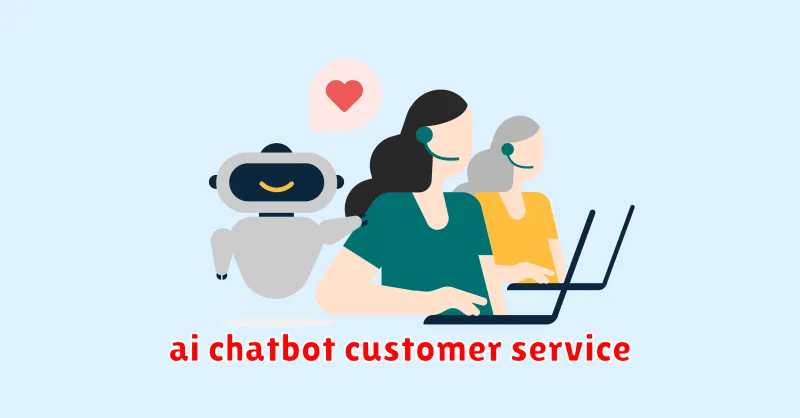The world of customer service is undergoing a revolution, and at the heart of this transformation lies the rise of AI-powered chatbots. These intelligent virtual assistants are no longer mere novelty, but are rapidly becoming the cornerstone of efficient and personalized customer experiences. From resolving queries to providing instant support, chatbots are proving their mettle in a myriad of industries, transforming the way businesses interact with their customers.
Gone are the days of long wait times and frustrating automated menus. AI chatbots are changing the game by leveraging cutting-edge natural language processing (NLP) and machine learning (ML) technologies to understand and respond to customer inquiries with unprecedented accuracy and empathy. This evolution is not limited to customer service, with chatbots finding applications in various sectors, including e-commerce, healthcare, finance, and education. As AI continues to advance, the potential for chatbots to revolutionize the way we interact with technology and information is vast.
Understanding AI-Powered Chatbots
AI-powered chatbots are revolutionizing the way businesses interact with customers. These intelligent programs leverage artificial intelligence (AI) to engage in conversations with users, providing information, completing tasks, and offering support in a human-like manner. Unlike traditional chatbots that rely on pre-programmed responses, AI chatbots utilize machine learning algorithms to analyze data, learn from interactions, and continuously improve their capabilities.
At their core, AI chatbots rely on Natural Language Processing (NLP) to understand and interpret human language. NLP enables chatbots to process text and voice inputs, extract meaning, and generate relevant responses. This technology allows them to understand context, identify intent, and provide personalized interactions.
Furthermore, AI chatbots leverage machine learning algorithms to analyze user data, identify patterns, and predict future behaviors. This data-driven approach enables them to continuously improve their performance, learn from past interactions, and personalize their responses. As they accumulate more data, their understanding of user needs and preferences evolves, resulting in more accurate and efficient interactions.
The rise of AI-powered chatbots is driven by several key factors:
- Increased customer expectations for 24/7 support and instant responses
- Growing demand for personalized experiences and tailored interactions
- Cost-effectiveness compared to traditional customer service methods
- Scalability and automation capabilities, enabling businesses to handle large volumes of inquiries
How AI Chatbots Work: A Look Under the Hood
AI chatbots are becoming increasingly prevalent, revolutionizing the way businesses interact with their customers. But how do these intelligent conversational agents actually work? Let’s take a peek under the hood.
At the core of every AI chatbot lies a powerful engine called Natural Language Processing (NLP). NLP allows the chatbot to understand and interpret human language, making sense of both the words and the context in which they are used. This is crucial for the chatbot to effectively engage in conversation, responding appropriately to a variety of queries and requests.
Once the chatbot has understood the user’s input, it then relies on a knowledge base, a vast repository of information tailored to the specific purpose of the chatbot. This knowledge base might include information about products, services, FAQs, or any other relevant data. The chatbot uses this information to formulate a response that is both accurate and relevant to the user’s query.
Beyond simply responding to user input, many AI chatbots leverage machine learning algorithms. These algorithms allow the chatbot to learn and adapt over time, becoming more sophisticated and effective in its interactions. By analyzing past conversations and user feedback, the chatbot can refine its understanding of language, improve its responses, and even anticipate user needs.
The combination of NLP, a knowledge base, and machine learning empowers AI chatbots to engage in dynamic and meaningful conversations, providing users with a seamless and personalized experience. Whether it’s answering questions, resolving issues, or offering personalized recommendations, AI chatbots are transforming the way we interact with technology and businesses alike.
Benefits of Using AI Chatbots for Businesses
AI chatbots are transforming the way businesses interact with customers. These intelligent virtual assistants can handle a wide range of tasks, from answering simple questions to providing personalized recommendations. By leveraging the power of AI, businesses can streamline their operations, improve customer satisfaction, and gain a competitive edge.
Here are some key benefits of using AI chatbots for businesses:
24/7 Availability
AI chatbots are always available, 24 hours a day, 7 days a week. This means that customers can get the information they need whenever they need it, without having to wait for a human representative to become available. This can be especially beneficial for businesses that operate in multiple time zones or that need to provide support to customers around the clock.
Cost-Effectiveness
AI chatbots can significantly reduce the cost of customer support. By automating repetitive tasks, chatbots can free up human agents to focus on more complex issues. This can lead to significant cost savings for businesses, especially in industries with high call volumes.
Improved Efficiency
AI chatbots can handle a large volume of queries simultaneously, without compromising the quality of service. This can significantly improve the efficiency of customer support operations. Businesses can respond to customer requests faster and more efficiently, leading to higher customer satisfaction.
Personalized Experiences
AI chatbots can collect data on customer preferences and behavior, allowing businesses to provide personalized experiences. This can include offering tailored recommendations, providing targeted promotions, and delivering relevant content. Personalized experiences can lead to increased customer engagement and loyalty.
Data Collection and Insights
AI chatbots can collect valuable data on customer interactions, such as frequently asked questions, customer feedback, and purchase history. This data can be analyzed to identify trends, improve customer service, and develop new products and services.
The benefits of using AI chatbots for businesses are numerous and far-reaching. By leveraging the power of AI, businesses can transform their customer service operations, improve efficiency, and gain a competitive edge.
Improving Customer Service with AI Chatbots
In today’s digital age, customer expectations are higher than ever. Consumers demand immediate, personalized, and efficient service. This is where AI-powered chatbots come into play, revolutionizing the way businesses interact with their customers.
AI chatbots are designed to mimic human conversation, providing instant support and resolving customer inquiries effectively. By leveraging natural language processing (NLP) and machine learning (ML), these chatbots can understand and respond to a wide range of questions, making customer interactions more natural and seamless.
Here are some key ways AI chatbots enhance customer service:
- 24/7 availability: AI chatbots are available around the clock, ensuring customers get immediate assistance regardless of the time or day.
- Faster response times: Chatbots can process and respond to queries instantly, eliminating the wait times associated with traditional customer service channels.
- Personalized experiences: Using customer data, AI chatbots can personalize interactions, providing tailored recommendations and solutions.
- Reduced costs: By automating routine tasks, chatbots free up human agents to focus on more complex issues, leading to cost savings.
- Scalability: Chatbots can handle a high volume of inquiries simultaneously, ensuring every customer receives prompt attention.
Beyond basic inquiries, AI chatbots can also handle complex tasks, such as:
- Order tracking: Provide real-time updates on order status and shipping information.
- Product recommendations: Suggest relevant products based on customer preferences and past purchases.
- Appointment scheduling: Help customers book appointments with ease.
- Troubleshooting: Guide customers through troubleshooting steps for common issues.
AI chatbots are transforming customer service by making it more efficient, accessible, and personalized. As AI technology continues to advance, we can expect even more innovative and transformative applications of chatbots in the years to come.
Automating Business Processes with AI-Powered Chatbots
In today’s fast-paced digital landscape, businesses are constantly seeking ways to enhance efficiency and improve customer experiences. AI-powered chatbots have emerged as a transformative solution, revolutionizing how companies interact with their customers and automate various business processes. These intelligent virtual assistants leverage natural language processing (NLP) and machine learning (ML) to understand and respond to user queries in a human-like manner, providing seamless and personalized interactions.
By automating repetitive tasks, AI chatbots free up human agents to focus on more complex and strategic endeavors. This includes handling routine inquiries, providing product information, scheduling appointments, and resolving simple issues. By taking on these tasks, chatbots significantly reduce response times and improve customer satisfaction. Moreover, they can operate 24/7, ensuring that customers receive immediate assistance regardless of the time of day.
Beyond customer service, AI chatbots can automate various business processes across different departments. For instance, in human resources, they can streamline onboarding processes, answer employee queries, and manage leave requests. In marketing, they can personalize recommendations, generate leads, and engage with potential customers. In finance, they can assist with invoice processing, payment reminders, and fraud detection.
The benefits of integrating AI-powered chatbots into business operations are undeniable. They enhance customer experiences, improve efficiency, reduce costs, and unlock new opportunities for growth. As AI technology continues to advance, we can expect even more sophisticated chatbots that can perform even more complex tasks, further transforming the way businesses operate and interact with their stakeholders.
The Future of AI Chatbots: Trends and Predictions
AI chatbots are rapidly transforming customer service and beyond. As technology continues to advance, we can expect to see even more exciting developments in this field. Here are some key trends and predictions for the future of AI chatbots:
Increased Personalization: AI chatbots are becoming increasingly sophisticated in their ability to understand individual customer needs and preferences. This will allow for highly personalized interactions, leading to improved customer satisfaction and loyalty.
Multimodal Interactions: AI chatbots will integrate with multiple channels, including voice, text, and even video, offering a more immersive and engaging experience for users. This will enable chatbots to handle a wider range of tasks and provide more comprehensive support.
Advanced NLP Capabilities: Natural Language Processing (NLP) is constantly evolving, allowing chatbots to better understand and respond to complex human language. This will make conversations with chatbots more natural and intuitive.
Integration with Other Technologies: AI chatbots will seamlessly integrate with other technologies, such as IoT devices and data analytics platforms. This will enable chatbots to gather valuable insights and provide personalized recommendations.
Focus on Emotional Intelligence: AI chatbots are starting to incorporate emotional intelligence, allowing them to recognize and respond to human emotions. This will create more empathetic and satisfying interactions.
Ethical Considerations: As AI chatbots become more prevalent, it is crucial to address ethical considerations such as data privacy, bias, and transparency. Developers will need to ensure that chatbots are used responsibly and ethically.
The future of AI chatbots holds immense potential. By leveraging the latest advancements in AI and NLP, chatbots will continue to revolutionize the way we interact with technology and businesses. These trends and predictions suggest a future where AI chatbots become an integral part of our lives, offering personalized, efficient, and engaging experiences.
Choosing the Right AI Chatbot for Your Business
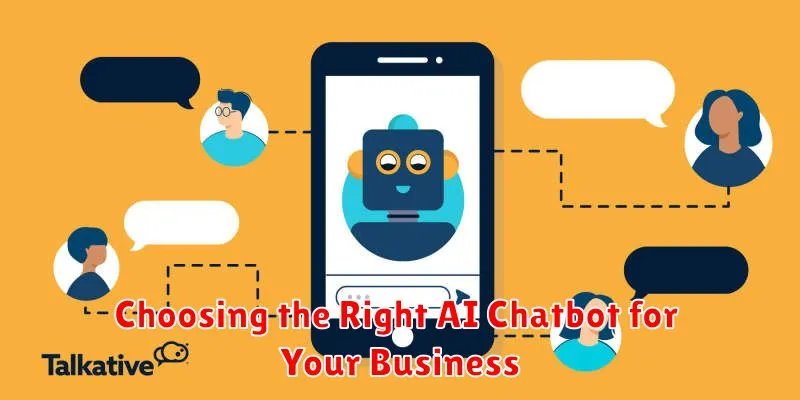
The rise of AI-powered chatbots has revolutionized the way businesses interact with their customers. Chatbots offer a cost-effective and efficient way to automate customer service, providing instant responses and round-the-clock availability. But with a plethora of chatbot options available, choosing the right one for your business can be a daunting task.
To make an informed decision, consider the following factors:
1. Business Needs and Goals:
Clearly define what you want your chatbot to achieve. Are you aiming to improve customer service, generate leads, or automate specific tasks? Understanding your specific goals will help you narrow down the options.
2. Features and Functionality:
Look for chatbots that offer the features you need, such as natural language processing (NLP), sentiment analysis, and integration with other systems. Consider whether you need a chatbot that can handle complex conversations or simply provide basic information.
3. Scalability and Customization:
Choose a chatbot platform that can scale with your business needs. Consider the ability to customize the chatbot’s personality, language, and responses to align with your brand identity.
4. Integration Capabilities:
Ensure that the chatbot seamlessly integrates with your existing systems, such as CRM, email marketing, and social media platforms. This enables data sharing and a unified customer experience.
5. Cost and Support:
Evaluate the cost of the chatbot platform, including setup fees, monthly subscriptions, and support services. Look for affordable options that offer reliable support and training.
By carefully considering these factors, businesses can choose the right AI chatbot to enhance customer service, streamline operations, and unlock new opportunities for growth.
Industries Revolutionized by AI Chatbots
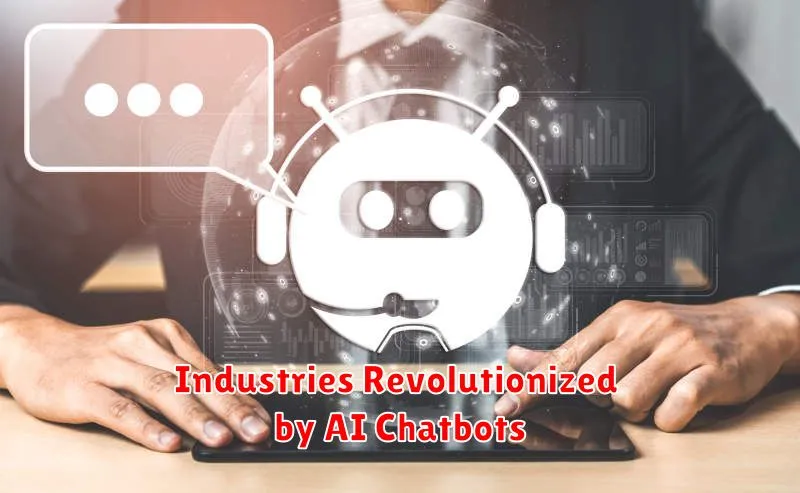
The rise of AI-powered chatbots has ushered in a new era of customer service and beyond. These intelligent virtual assistants are revolutionizing industries by automating tasks, enhancing customer experiences, and driving efficiency. Here are some of the industries where AI chatbots are making a significant impact:
Customer Service
Customer service is at the forefront of chatbot adoption. AI-powered chatbots provide instant responses to customer inquiries, resolve issues, and offer personalized recommendations, 24/7. This round-the-clock availability reduces wait times, improves customer satisfaction, and frees up human agents to focus on more complex tasks.
E-commerce
In the competitive world of e-commerce, AI chatbots are a game-changer. They assist shoppers with product discovery, provide personalized product recommendations, answer questions about shipping and returns, and even help with order tracking. By offering seamless and personalized shopping experiences, chatbots contribute to higher conversion rates and customer loyalty.
Healthcare
AI chatbots are transforming healthcare by improving patient engagement and providing remote healthcare solutions. They can schedule appointments, answer basic health questions, remind patients of medication schedules, and even assist with diagnosis. With the potential to reduce healthcare costs and improve patient outcomes, AI chatbots are poised to play an increasingly vital role in the healthcare industry.
Finance
The financial sector is leveraging AI chatbots to streamline operations and enhance customer interactions. Chatbots can provide financial advice, answer questions about investment options, handle account inquiries, and even process transactions. By automating routine tasks and offering personalized financial guidance, AI chatbots are revolutionizing the way financial institutions interact with their customers.
Education
AI chatbots are finding their way into the education sector, offering personalized learning experiences and supporting both students and educators. They can provide tutoring, answer questions, offer feedback on assignments, and even assist with course registration. By making education more accessible and engaging, AI chatbots have the potential to transform the learning landscape.
The impact of AI-powered chatbots extends beyond these industries. From travel and hospitality to real estate and entertainment, chatbots are transforming the way businesses operate and interact with their customers. As AI technology continues to advance, we can expect to see even more innovative applications of chatbots in the years to come.
Ethical Considerations in AI Chatbot Development
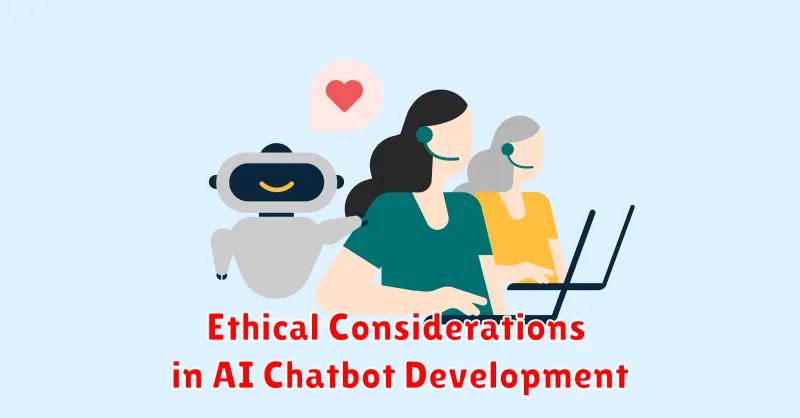
As AI-powered chatbots become increasingly sophisticated and prevalent in various industries, it’s crucial to address the ethical considerations surrounding their development and deployment. While chatbots offer numerous benefits, including enhanced customer service and increased efficiency, their impact on society requires careful examination.
One primary ethical concern is bias. AI algorithms are trained on massive datasets, which can reflect existing societal biases. If these biases are not mitigated, chatbots may perpetuate discriminatory practices, leading to unfair treatment of certain individuals or groups. For instance, a chatbot designed to provide financial advice might unknowingly discriminate against individuals based on their gender or ethnicity.
Another key ethical issue is transparency and accountability. It’s essential to ensure that users understand they are interacting with a chatbot and not a human. Users should be informed about the limitations of the chatbot and its capabilities. Furthermore, there needs to be a clear mechanism for addressing errors or instances of inappropriate behavior. Transparency and accountability are critical for building trust and maintaining user confidence.
Privacy and data security are paramount considerations in chatbot development. Chatbots often collect personal data from users, and it’s imperative to ensure this data is handled responsibly and ethically. Data should be used only for the intended purpose, stored securely, and protected from unauthorized access. Clear consent mechanisms and transparent data usage policies are crucial.
Finally, it’s essential to consider the potential displacement of human jobs by chatbots. While chatbots can automate tasks and improve efficiency, there’s a risk of displacing human workers. Developers must proactively consider the societal impact and mitigate potential job losses by focusing on retraining and upskilling programs for affected individuals.
Ethical considerations in AI chatbot development are multifaceted and complex. By addressing these concerns proactively, we can ensure that chatbots are developed and deployed responsibly, contributing to a more inclusive and equitable society.
AI Chatbots vs. Human Agents: Striking the Right Balance
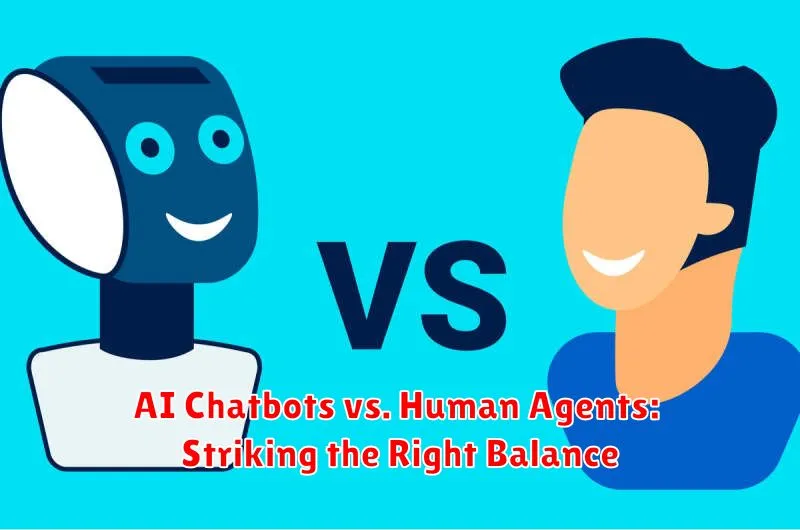
The rise of AI-powered chatbots has dramatically changed the landscape of customer service. These sophisticated virtual assistants are capable of handling a wide range of tasks, from answering basic questions to resolving complex issues. While chatbots offer numerous advantages, it’s crucial to acknowledge that they are not a complete replacement for human agents. Instead, the key lies in finding the right balance between these two forces.
AI chatbots excel in areas like:
- 24/7 availability: Chatbots can provide instant support around the clock, eliminating the need to wait for business hours.
- Scalability: They can handle a high volume of inquiries simultaneously, ensuring efficient service even during peak times.
- Consistency: Chatbots provide standardized responses, ensuring consistency in customer experience.
- Cost-effectiveness: Compared to human agents, chatbots can significantly reduce operating costs.
However, human agents remain crucial for:
- Empathy and emotional intelligence: Human agents can understand and respond to complex emotions, building stronger customer relationships.
- Problem-solving and critical thinking: They can analyze nuanced situations and provide customized solutions.
- Personalization: Human agents can tailor their interactions based on individual customer needs and preferences.
- Building trust and loyalty: Human interaction builds trust and fosters stronger customer loyalty.
The ideal approach is to leverage the strengths of both AI chatbots and human agents. Chatbots can handle routine inquiries, freeing up human agents to focus on more complex and nuanced tasks. This hybrid model ensures efficient and effective customer service while enhancing the overall customer experience.
By striking the right balance, businesses can unlock the full potential of AI-powered chatbots while retaining the human touch that is essential for building lasting customer relationships.
Measuring the ROI of AI Chatbot Implementations
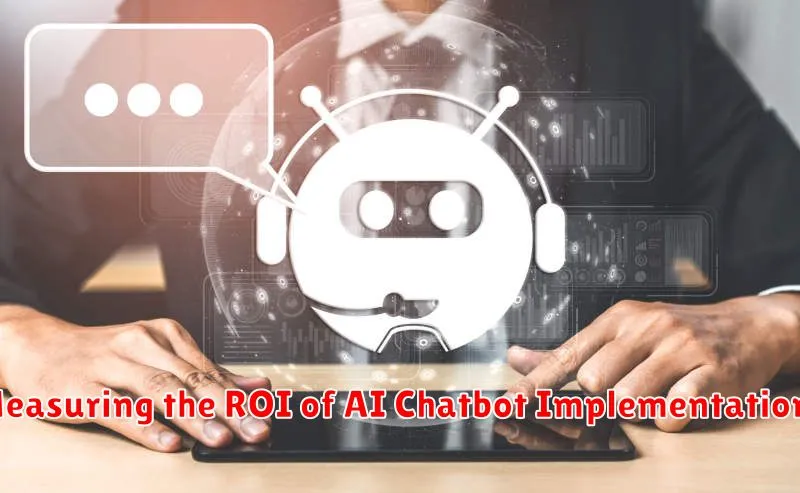
As AI-powered chatbots become increasingly prevalent, businesses are eager to understand the tangible benefits they offer. A key question arises: How can we measure the return on investment (ROI) of chatbot implementations? While measuring ROI can be complex, several key metrics provide valuable insights.
Cost Savings: Chatbots can significantly reduce labor costs by automating routine customer service interactions. By handling frequently asked questions and basic requests, they free up human agents to focus on more complex issues. Tracking the number of interactions handled by the chatbot, along with the associated cost savings, provides a clear picture of this benefit.
Improved Efficiency: Chatbots can respond instantly to customer inquiries, regardless of the time of day. This 24/7 availability improves efficiency and reduces customer wait times. Measuring the average response time and resolution time for chatbot-handled inquiries highlights the efficiency gains.
Enhanced Customer Satisfaction: Chatbots can provide consistent and personalized customer experiences. They can remember past interactions, offer relevant recommendations, and even engage in conversational interactions. Tracking customer satisfaction scores, Net Promoter Scores (NPS), and feedback surveys provides insights into the impact on customer experience.
Increased Revenue: Chatbots can drive revenue by promoting products and services, assisting with transactions, and collecting valuable customer data. Monitoring sales conversions, upselling and cross-selling opportunities, and the volume of leads generated by the chatbot reveals the revenue-generating potential.
Beyond Traditional Metrics: Beyond quantifiable metrics, consider the intangible benefits of chatbot implementation. Improved brand image, increased customer loyalty, and a more agile and responsive customer service team are all valuable outcomes.
By tracking and analyzing these metrics, businesses can gain a comprehensive understanding of the ROI of their AI chatbot implementations. This data-driven approach enables informed decision-making, continuous improvement, and ultimately, a more successful customer experience.

